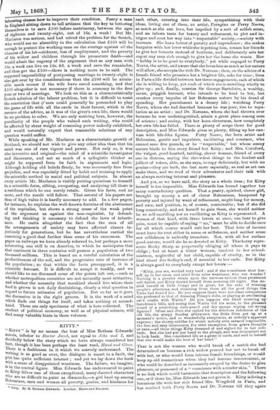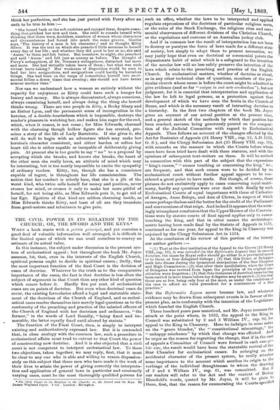KITTY.*
" KrrrY " is by no means the best of Miss Betham Edwards' novels, inferior to Doctor Jacob, not equal to John and I, and decidedly below the story which we have always considered her best, though it has been perhaps the least read, Hand and Glove. There is a feebleness in it which we scarcely understand. The writing is as good as ever, the dialogue is smart to a fault, the plot has quite sufficient interest ; and yet we lay down the book th a sense of disappointed weariness. The failure, we imagine, Ia. in the central figure. Miss Edwards has endeavoured to paint in Kitty Silver one of those exceptional, many-faceted characters who are as difficult to paint as diamonds,—a girl bred up among Bohemians, men and women all poverty, genius, and kindness for
each other, entering into their life, sympathizing with their ideas, loving one of them, an artist, Perugino or Perry Neeve, as much as she can love, but impelled by a sort of selfish sense, and an inborn taste for luxury and refinement, to plot and intrigue and coax her way into " respectable" society,--society with incomes. She has a horror of poverty and imprudence ; she makes bargains with her lover while she is petting him, coaxes her friends to give her bonnets instead of bonbons, and deliberately sets her cap at any man rich enough to give her the home she wants. Her " hobby is to be good to everybody," yet while engaged to Perry Neeve, the artist, and aware that she loves him as much as her nature will allow, she accepts the rich Dr. Norman ; then, on the advice of a female friend who promises her a brighter life, asks for time ; lives in Paris a life divided between her three engagements, each of which she is willing to keep, yet each of which she is unwilling wholly to give up ; and, finally, marries Sir George Bartelotte, a wealthy, mean, priggish baronet, who intends to be kind to her, but crushes every impulse of her Bohemian nature by his dread of spending. Her punishment is a dreary life ; watching Perry Neeve, whom she had deserted because he was poor, rise to reputation as an artist ; and Dr. Norman, whom she had thrown over because he was undistinguished, attain a great place among men of science ; and seeing, with her keen cleverness, how completely her own life has failed. There is plenty of scope there for good description, and Miss Edwards gives us plenty, filling up her can vass with life-like figures. Perry Neeve, the born artist and Bohemian, gentle and impulsive, vacillating and constant, who cannot save five pounds, or be "respectable," but whose sunny nature binds to him every friend but Kitty ; and Mrs. Coruford, the vulgar, good-hearted, rattling, clever woman, friend of every one in distress, saying the shrewdest things in the loudest and jolliest of voices, able, as she says, to copy deliciously, but with no genius—they are both, the last more especially, as real as art can make them, and we read of their adventures and their talk with an always reviving interest and pleasure.
And yet, as we have said, the story as a whole tires ; for Kitty herself is too impossible. Miss Edwards has bound together too many contradictory qualities. That a pretty, spirited, clever girl, brought up among a set of clever Bohemians, hampered by poverty and injured by want of refinement, might long for money, and ease, and position, is, of course, conceivable ; but if she did long consciously, and set herself to gain them, she would neither be so self-sacrifiing nor so vacillating as Kitty is represented. A women of that kind, with three lovers at once, can bear to give pain, must be capable of saying " no," must be able to decide once for all which course would suit her best. That love of income must have its root either in sense or selfishness, and neither sense nor selfishness is radically irresolute. Nor, with all her surface good-nature, would she be so devoted as Kitty. Thackeray represents Becky Sharp as perpetually obliging all whom it pays to oblige ; but at heart a bitter woman, insolent to her schoolmistress, neglectful of her child, capable of cruelty, as in the hint about Jos Sedley's end, if essential to her ends. But Kitty is always good to everybody except her lovers :
"Kitty, you see, worked very hard ; and if she sometimes shut herself up in her room and cried from utter weariness, who can wonder ? Nothing is a greater strain upon the nervous system than persistent self-denial, and Kitty denied herself from morning till night. She denied herself in little things and in groat, for the sake of winning people's affections, and obtaining from them all the good things the Fates had denied her. Do you suppose there wore not other occupations she preferred to that of dressing Prissy's dolls, or playing at everlasting cat's cradle with Wattle? Do you suppose she liked counting up laundress's bills, and seeing that Wattle did his sums, to the pleasant sound of a scratching slate-pencil and dry sponge wiping out wrong figures ? Often and often she sighed for the delicious indolence of the old life, the sleepy Sunday afternoons, the little fates got up at a moment's notice, and so wonderfully sumptuous, at nobody's apparent expense; the sherry-cobbler for which nobody ever seemed responsible, the free and easy intercourse, the utter exemption from grave thoughts or care,—all these things Kitty dreamed of and sighed for in her solitude. But she had put her hand to the plough, and was determined not to look back. She considered life as a game of cards, and said to herself that she would make the best of her hand."
That is not the woman who would break off a match she had determined on because a rich widow pressed her not to break off with her, or who would form intense female friendships, or would keep up old connections when they had become inconvenient, or who could be described as incessantly swayed by the desire to give pleasure, or possessed of a " conscience with a tender skin." There is no link which could harmonize that description and the following one, or if there be, Miss Edwards has not given it. Kitty is living a luxurious life with her rich friend Mrs. Wingfield in Paris, and has soothed both Perry Neeve and Dr. Norman till they again
think her perfection, and she has just parted with Perry after an oath to be true to him :—
" She leaned back on the soft cushions and enjoyed them, despite something that pricked her now and then. She tried to console herself with thinking that there were, doubtless, numbers of women whom characters and circumstances had forced into much the same groove. Goethe says, 'The history of a man is his character ;' and so thought Kitty Silver. It was the text on which she preached little sermons to herself every day of her life ; and whether they did good to her or no, she said Amen ' to them and felt better. But somehow, to-night, she preached and said Amen,' and felt just as uneasy as before. Tke thought of Perry's =happiness, of Dr. Norman's unhappiness, disturbed her more and more. She had virtually taken leave of them ; but what was such virtual leave-taking ? Her weakness of disposition would be sure to lead her into assignations, and assignations could hardly be harmless things. She had been on the verge of committing herself into sentimental follies a dozen times that evening ; she should not have better armour another time."
Nor can we understand how a woman so entirely without the capacity for enjoyment as Kitty could have such a hunger for luxury and money. She is always discontented, always conscious, always examining herself, and always doing the thing she herself thinks wrong. There are two people in Kitty, a Becky Sharp and an Esther Lyon, and the permanent sense of incongruities in the heroine, of a double-heartedness which is impossible, destroys the reader's pleasure in watching her, and makes him eager for the end, which, when it comes, is not come ; for Miss Edwards, charmed with the charming though hollow figure she has created, promises a story of the life of Lady Bartelotte. If she gives it, she will do well to begin with an adventure which may make her heroine's character consistent, and either harden or soften her heart till she is either capable or incapable of deliberately giving pain. At present she is too gentle to say " no " to a proposal by accepting which she breaks, and knows she breaks, the heart of the other man she really loves, an attitude of mind which may be interesting, but is too nearly impossible to excite the sympathy of ordinary readers. Kitty, too, though she has a conscience capable of regret, is throughout her life conscienceless. The notion that her conduct is utterly base, that she is a jilt of the worst kind, who twice sells herself for money and position, never crosses her mind, or crosses it only to make her more pitiful of herself, for not being able, as Miss Edwards puts it, to get rid of her Ego. Egotists of that kind are seldom charming inside, as Miss Edwards thinks Kitty, and least of all are they irresolute from good-nature and reluctance to give pain.































 Previous page
Previous page